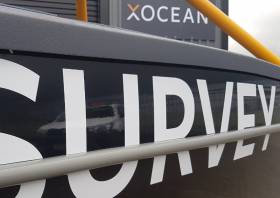Displaying items by tag: Xocean
Many assorted vessels visit Bangor Marina, but the XOcean Uncrewed Surface Vessel (USV) may be the most unusual. Last week, Harbour Master Kevin Baird and his team, MCA staff and Belfast Coastguard welcomed the UK Maritime Minister Baroness Vere of Norbiton, Charlotte Vere, and the dynamic XOcean team.
The vessel Baroness Vere explored might seem unconventional, but it's revolutionising commercial boating.
It is a craft that can remain offshore for extended periods, harvesting large volumes of ocean data. Operators and data analysts remain safely located onshore, connected to the vessels over a satellite link.
As Afloat reported previously, trial operations of the USV took place in the Dundalk Bay area in mid November 2022.
Offering a carbon-neutral approach to mapping vast oceans, it can function untouched for 28 days with a 1,500 nautical mile range, all through satellite communications.
Harbour master Baird commented.” It’s hard to imagine a future where ships are operated from onshore stations, with crews only needed for specific harbour operations. That future is approaching fast, with companies like XOcean, based in Dublin, leading the charge. Thanks to everyone who made this visit memorable and enlightening”.
Uncrewed Vessel Trials in Dundalk Bay Ahead of Oriel Wind Farm Survey
Trial operations of remotely piloted uncrewed surface vessels (USVs) are planned to take place in the Dundalk Bay area from this week until mid November.
Subject to weather and operational constraints, the operations will run for a period of four weeks from Thursday 20 October.
The XO-450-type USVs from Greenore-based Xocean will be engaged in survey activities for the proposed Oriel Wind Farm in the Irish Sea some 22km off the coast of Dundalk in Co Louth.
This is a non-invasive survey, Xocean says, and no contact with the seabed or any other infrastructure is planned during survey operations.
The USVs will send real-time images and situational awareness data over satellite to a team of operators keeping watch and controlling the vessel remotely 24/7.
Although the vessels are uncrewed, they are constantly monitored and controlled, and piloted remotely using 360-degree cameras and other navigational aids.
Each USV is equipped with AIS, navigation lights and a sound signal, an active radar reflector and a yellow-painted superstructure to make it conspicuous to other marine traffic.
All other vessels operating within the affected area are requested to avoid contact with any USV and be aware of the operational area during this period. A Radio Navigation Warning will be in place during operations.
Contact details, relevant coordinates and a map of the survey area are included in Marine Notice No 71 of 2022, attached below.
Environmental Survey by Uncrewed Vessel in Dundalk Bay This Week
Survey operations conducted by an uncrewed surface vessel (USV) are taking place in Dundalk Bay this week.
The remotely piloted X-09 — from Greenore-based Xocean — was scheduled to launch from Clogherhead, Co Louth today, Tuesday 25 January, for the weeklong survey.
It will be engaged in survey activities supporting environmental research in the area. The survey will utilise multibeam echosounder to characterise the seabed across the site.
The USV sends real-time images and situational awareness data over satellite to a team of operators keeping watch and controlling the vessel remotely 24/7.
A Radio Navigation Warning will be in place during operations, and the USV has been made conspicuous to other marine traffic via its yellow superstructure, AIS, navigation lights and sound signal, and active radar reflector.
Coordinates and maps of the survey area are included in Marine Notice No 05 of 2022, attached below.
All other vessels operating within this area are requested to avoid contact with the USV and be aware of the operational area during this period.
Marine Tech Firm Xocean Eyes Expansion To North America & Beyond
Louth-based marine technology firm Xocean is following its recent funding boost with plans to expand into North America and eventually Asia, according to business news site Fora.
The company specialises in innovative robotics, particularly unmanned vehicles, and IoT technology to monitor and collect data at sea.
Earlier this year it was awarded €199,739 in funding over two years via the Marine Institute to transform marine monitoring and data collection, as previously reported on Afloat.ie.
In addition the Greenore-based business raised half a million euro from Chris Huskilson, former CEO of Canadian energy company Emera and now chairman of Xocean.
While its focus until now has been on northern Europe, with clients including the UK’s Maritime and Coastguard Agency, Xocean confirms it is in discussions to deliver its first projects in the US and Canada within the next six months.
Fora has much more on the story HERE.
























































